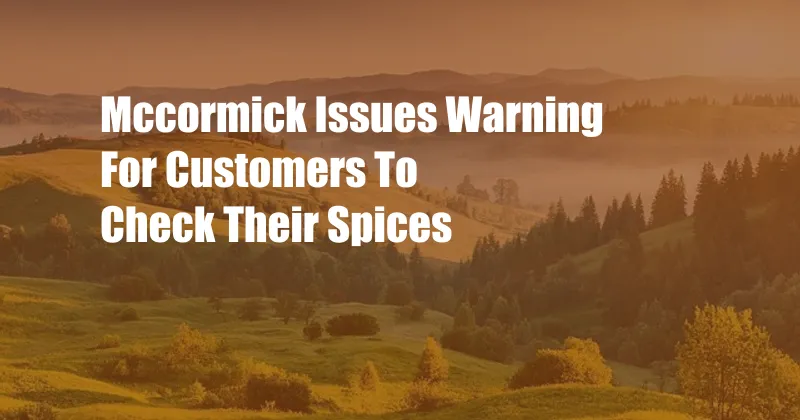
McCormick Issues Urgent Warning: Check Your Spices Immediately!
As avid home cooks, we often rely on spices to add flavor and zest to our culinary creations. However, a recent announcement by McCormick & Company, a leading spice manufacturer, has sent shockwaves through the culinary world. The company has issued an urgent warning to consumers to check their spice cabinets for potential contamination with salmonella.
The salmonella bacteria can cause serious illness when ingested, leading to symptoms such as nausea, vomiting, diarrhea, fever, and abdominal cramps. In severe cases, salmonella can even be life-threatening.
Salmonella Contamination in Spices
According to McCormick, the potential contamination affects a limited number of spice products manufactured in its Hunt Valley, Maryland facility. The affected products include:
- Ground black pepper
- Ground red pepper
- Ground white pepper
- Ground cumin
- Ground coriander
- Ground turmeric
- Other select spice blends
The Food and Drug Administration (FDA) is investigating the source of the contamination and working with McCormick to identify and recall the affected products.
How to Check Your Spices
If you have any of the affected McCormick spice products in your kitchen, it is crucial to check the product code to determine if it is included in the recall. The product code can be found on the bottom of the container. A list of the recalled product codes is available on the McCormick website.
If you find that you have any of the recalled products, McCormick strongly advises consumers to discard them immediately and contact the company for a full refund. Do not consume the affected spices, as they pose a potential health risk.
Tips and Expert Advice
To minimize the risk of foodborne illness from contaminated spices, it is essential to follow proper food handling practices. Here are some tips from food safety experts:
- Always store spices in a cool, dry place away from direct sunlight.
- Use clean measuring spoons and cups to avoid cross-contamination.
- Discard any spices that show signs of spoilage, such as mold or discoloration.
- Wash your hands thoroughly with soap and water before and after handling spices.
- Cook foods to the proper internal temperature to kill any potential bacteria.
To ensure the safety of your food and prevent the spread of salmonella, it is crucial to take these precautions seriously. By following these guidelines, you can help protect yourself and your family from foodborne illness.
Frequently Asked Questions
Q: How can I determine if my McCormick spices are affected by the recall?
A: Check the product code on the bottom of the spice container against the list of recalled product codes available on the McCormick website.
Q: What should I do if I have any of the recalled spices?
A: Discard the spices immediately and contact McCormick for a full refund.
Q: Is it safe to use spices from other brands?
A: Yes, as long as they are from reputable brands that follow strict food safety standards.
Q: Can I still use spices that were purchased before the recall announcement?
A: It is best to err on the side of caution and discard any spices that may have been cross-contaminated. It is always advisable to check the product code to be sure.
Conclusion
The McCormick spice recall is a reminder of the importance of food safety and the potential risks associated with contaminated food products. By following the guidelines outlined in this article, you can minimize the risk of foodborne illness and ensure the safety of your food.
We encourage our readers to share this information with their friends and family to spread awareness about the recall and promote food safety practices. Your actions can help protect others from potential health risks.
Are you interested in knowing more about food safety and how to prevent foodborne illness? Let us know in the comments below!